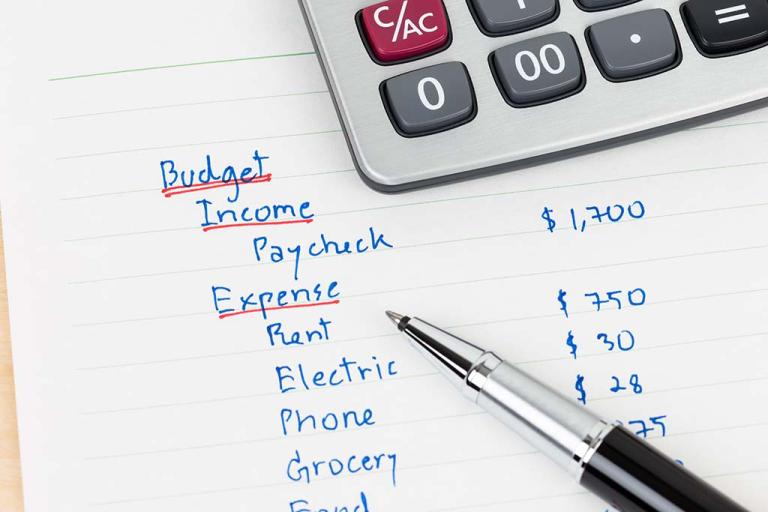On this page
What's next
Earn a high-yield savings rate with JG Wentworth Debt Relief
How to Calculate Your Debt-To-Income Ratio
by
JG Wentworth
•
December 5, 2022
•
5 min

The information on this blog is provided for educational and informational purposes only. Such information or materials do not constitute and are not intended to provide legal, accounting, or tax advice and should not be relied on in that respect. We suggest that you consult an attorney, accountant, and/or financial advisor to answer any financial or legal questions.
If you’re working on paying off your debt, you know that there are a lot of factors to consider when creating a repayment plan: how many credit accounts you have, what your interest rates are, when your payments are due each month, and so on.
But for many consumers, their debt-to-income (DTI) ratio is a helpful—but often overlooked—tool for measuring their own ability to repay their debts successfully. Knowing your DTI can give you insight as to how long it might take you to repay your debts and whether you can afford to take on more debt.
While it’s helpful for you as a borrower to know what your DTI is, it’s also a tool that lenders use to determine your likelihood of being able to repay your debts each month. That is, your DTI is as important to your own budgeting and debt repayment plan as it is to any potential lenders you’ll borrow from in the future.
What is a debt-to-income ratio?
Your DTI ratio is exactly what it sounds like: the amount you owe each month compared to the amount you make. DTI ratios are percentages that represent your gross (pre-tax) monthly income divided by the total amount of debt you owe each month.
Calculating your debt-to-income ratio

To calculate your DTI ratio, first add up your total monthly debt. That total debt includes any fixed monthly expenses, such as:
- Mortgage payments or rent
- Car payments
- Insurance premiums
- Student loan payments
- Credit card minimum monthly payments
Monthly expenses that vary, like groceries, utilities, and so on, should not be included in your total debt calculation.
Once you add up your total monthly debts, find the pre-tax amount of income on your paychecks. If you get paid twice a month, multiply that number by two to get your monthly income. Make sure to also include monthly income from Social Security, alimony, child support, and tips.
Then, divide your monthly debt amount by your gross monthly income. The figure you’ll get will have a decimal point, so move the decimal point two digits to the right to create a percentage.
And that’s it—now you know your DTI ratio!
Related Article: A Guide to Everything You Want to Know About Credit
What is a good debt-to-income ratio?
Knowing your DTI ratio is one thing—but knowing what it means to lenders is another. Now that you have your DTI ratio calculated, where do you stand?
35% or less
If you fall at 35% or less, you’re in good shape! Not only do you have money left over each month for savings each month, but also, lenders are more likely to look at you as a good candidate for a loan. Great job!
36% to 49%
Your DTI won’t necessarily be a dealbreaker, but you definitely have room for improvement. You’re staying afloat and can pay off your debts, but you might not have a lot of money left over for emergency expenses and saving.
Nevertheless, you’re not in bad shape—but you may want to consider making a few financial changes to improve your DTI ratio.
49% or higher
If your DTI is over 49%, your finances are strained—but you don’t need us to tell you that. Lenders may not offer you favorable rates for loans, and you may be struggling to save money and pay for emergency expenses.
Related Article: Bankruptcy: A Complete Guide
What can I do if I have a high debt-to-income ratio?
If your DTI is anything less than good, then you may want to start thinking seriously about ways to lower that percentage. This could look like a lot of things: spending less on flexible expenses, taking on a second job, moving in with a roommate, and so on. But what if you’re already doing everything you can to stay afloat?
You may have another option: consolidating your debts using a personal loan. JG Wentworth is on a mission to help people get financially fit, so we can connect you with top lenders to provide customized loans for people stuck in the cycle of repayment on high-interest debts.*
To explore your personalized loan options today, check out our free online tool.
If a loan isn’t ideal for you, though, we might still be able to help! Our Debt Resolution Program could help you lower your debt and pay it off in as few as 24 to 48 months.**
To talk to one of our Debt Specialists about your options, give us a call today at (888) 505-1794.
Related Article: What’s the Difference Between Debt Consolidation and Debt Resolution?
Sources cited
- Calculate your debt-to-income ratio. Wells Fargo. (n.d.). Retrieved from https://www.wellsfargo.com/goals-credit/smarter-credit/credit-101/debt-to-income-ratio/
Want to learn more about our debt solutions?
Fill out this form and we’ll be in touch.
About the author
Recommended reading for you
*JGW Debt Settlement, LLC d/b/a JG Wentworth (“JG Wentworth”) has partnered with MoneyLion to provide this loan referral service. JG Wentworth is not a lender and cannot ultimately decide whether or not you are approved for a loan. JG Wentworth does not determine or influence the amount of money you may receive from using this referral services.
**The debt resolution program is provided by JGW Debt Settlement, LLC. JGW Debt Settlement, LLC is licensed/registered to provide debt resolution services in states where licensing/registration is required. Debt resolution program results will vary by individual situation. As such, it may not be suitable for all persons. JG Wentworth does not offer debt resolution services in all states and fees may vary from state to state. Not all debts are eligible for enrollment. Not all individuals who enroll complete our program for various reasons, including their ability to save sufficient funds. Savings resulting from successful negotiations may result in tax consequences, please consult with a tax professional regarding these consequences. The use of debt relief services can potentially have an adverse impact on your credit rating, may result in you being subject to collections, and may result in other adverse action by creditors or collection agencies. Read and understand the program contract prior to enrollment. JG Wentworth does not pay or assume any debts or provide legal, financial or tax advice or credit repair services. You should consult with independent professionals for such advice or services. Please consult with a bankruptcy attorney for more information on bankruptcy. JGW Debt Settlement operates in the following states: AL, AK, AZ, AR, CA, CO, FL, ID, IN, IA, KY, LA, MD, MA, MI, MS, MO, MT, NE, NM, NY, NC, OK, PA, SD, TN, TX, UT, VA, DC, and WI. If a consumer in CT, GA, HI, IL, KA, ME, NH, NJ, OH, RI, SC and VT contacts us we may connect them with a law firm that provides debt resolution services in their state.






